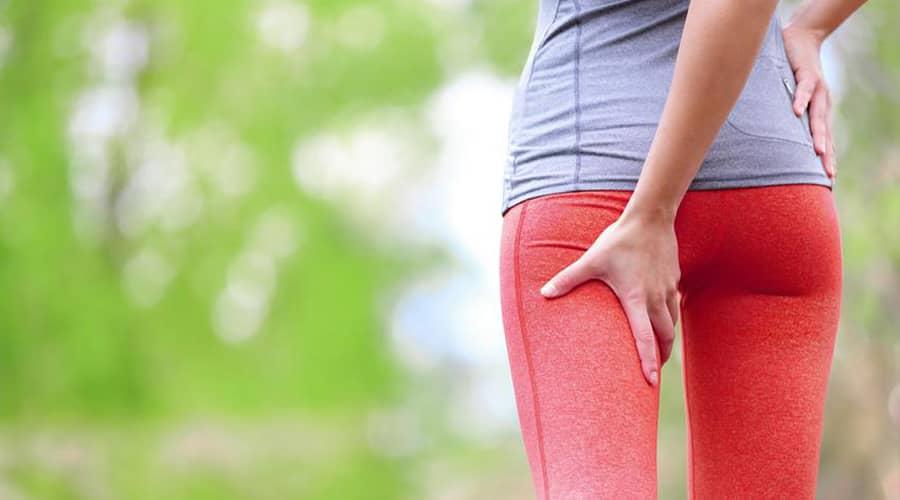
Rectal pain can be a very unpleasant and excruciating pain, especially for people who do sedentary work. The technical term for rectal pain is proctalgia.
Let’s also look at the most common causes of anal pain:
Rectal rupture:
This means a small tear in the skin of the anus that can be caused by a large amount or hard stool. It is also very often associated with rectal pain or anus pain.
Symptoms may include:
-sharp pain on defecation
-burning or stabbing pain that can last for hours
-small amounts of blood on the toilet paper
This tear can be very painful, but the good news is that it can heal within a few weeks. You can help yourself a lot by eating fibre-rich foods and drinking plenty of fluids. The important thing is to keep your stools loose.
Causes of internal rectal pain
There are several possible causes of internal rectal pain.
Inflammation: inflammation of the rectum or colon, such as colitis or Crohn’s disease, can cause pain in the rectal area. Lower abdominal pain radiating into the rectum can very often be traced back to inflammatory problems.
Hemorrhoids: the causes of rectal pain can often be traced back to hemorrhoids. Hemorrhoids are dilated veins in the rectum. They can often cause pain, especially internal haemorrhoids, which are located in the inner part of the rectum.
Rectal fissures: small fissures may form in or around the rectum, for example as a result of severe constipation or excessive straining. These tears can cause pain in the rectal area.
Inflamed rectal polyps: polyps that form in the rectum can sometimes become inflamed and cause pain.
Intestinal infections: bacteria, viruses or parasites can cause infections in the large intestine or rectum, which can cause pain.
Kidney or urinary tract problems: Sometimes kidney stones or other urinary tract disorders can cause pain that can be felt in the rectal area.
Hemorrhoids:
Hemorrhoids are known to almost everyone. It’s a swelling that contains blood vessels around the anus. Many experts believe it may be caused by persistent constipation. In many cases, haemorrhoids cause no symptoms at all. If symptoms do occur, they may include:
-bleeding on defecation
-shaky anus
-nervous sensation in or around the anus
-pain around the anus
-continuous anal pain
– may also produce a burning sensation in addition to the stabbing pain in the rectum
– burning sensation around the anus
In the best case, symptoms disappear within a few days. Be sure to increase your fibre and fluid intake and use a haemorrhoid ointment such as HillVital Aurumflex balm.
Eszter
“I ordered it for my boyfriend, it turned out to be the best choice, because after the first use he felt that his outer hemorrhoids had receded! Since then he uses it 2x a day, this cream is a miracle! Thank you very much, I am glad I found it, he has tried many drugstore creams, but we have not achieved such results so far. I recommend it to anyone who has been hesitant!”
If the pain does not go away, you should always consult a specialist. The worst case scenario is surgery to correct the problem.
Rectal fistula:
An anal fistula is an abnormal connection between the intestine and the anus. It is usually caused by an infection of the anus. If this wound does not heal, it may become ulcerated and an abscess may form.
Symptoms:
-continuous, throbbing pain and much worse when sitting
-skin irritation around the anus
-bleeding
-swelling around the anus
-may also develop a high fever
You will usually be prescribed antibiotics to treat it. If the symptoms do not go away, surgery may be necessary.
There are also much rarer causes that can lead to rectal pain. Let’s look at these now:
Levator ani syndrome: pain and pressure around the anus which may be constant, but may occur only every hour or every day.
Crohn’s disease: abdominal cramps, sudden weight loss and bloody diarrhoea may also develop.
Bone problems: this may be a very rare cause, but it should be reported. Pain caused by a bone tumour may affect the lower back or pelvis or even the hip.
Urinary tract problems: prostatitis can also cause rectal pain.
Vaginal infection: certain vaginal infections, such as vaginal thrush, can also cause pain and irritation in the rectal area. This means that rectal pain in women can also be caused by a vaginal infection.
Lower back and rectal pain can be caused by many different things.
Musculoskeletal problems: Musculoskeletal problems such as scoliosis, herniated discs, osteoporosis or arthritis can cause back pain and pain in the rectal area.
Gynaecological problems: fibroids in the uterus, ovarian cysts or endometriosis are gynaecological problems that can cause back pain and pain in the rectal area.
Urinary tract problems: urinary tract infections, kidney stones or cystitis can cause lower back pain and pain in the rectal area.
Inflammatory bowel disease: Crohn’s disease or ulcerative colitis are inflammatory bowel diseases that can cause back pain and pain in the rectal area.
Kidney or urinary tract stone: Kidney or urinary tract stones can cause lower back pain and pain in the rectal area, especially if the stones are blocking the urinary tract.
You should usually see a specialist immediately if the pain is very severe and does not improve at all in a few days. If you also experience rectal bleeding. If fever or pus discharge is also experienced in that case.
What are the possible causes of abdominal pain with rectal pain?
Abdominal and rectal pain can be caused by a variety of reasons. It is important that a medical examination is always necessary to make a proper diagnosis!
Constipation or diarrhoea: Digestive disorders such as constipation or diarrhoea can often cause abdominal pain and rectal pain. Excessive abdominal pressure or inflammation may be present in this case.
Hemorrhoids: hemorrhoids can often cause rectal pain and irritation, especially when defecating or sitting.
Kidney or urinary problems: Sometimes kidney or other urinary problems can also cause abdominal and lower back pain that can radiate to the rectal area.
Inflammatory bowel diseases: irritable bowel syndrome (IBS) or other inflammatory bowel diseases can also cause abdominal and rectal pain.
Inflammation or infection: inflammation or infection of the rectum or intestines can also lead to abdominal and rectal pain.
Diverticulitis: inflammation of the diverticula (small pouches in the wall of the large intestine), known as diverticulitis, can cause abdominal pain and rectal pain.
Sexually transmitted infections (STIs): certain sexually transmitted infections, such as chlamydia or gonorrhoea, can cause abdominal pain and rectal pain.
Endometriosis: If the symptoms occur in women, endometriosis may also play a role in the pain.



